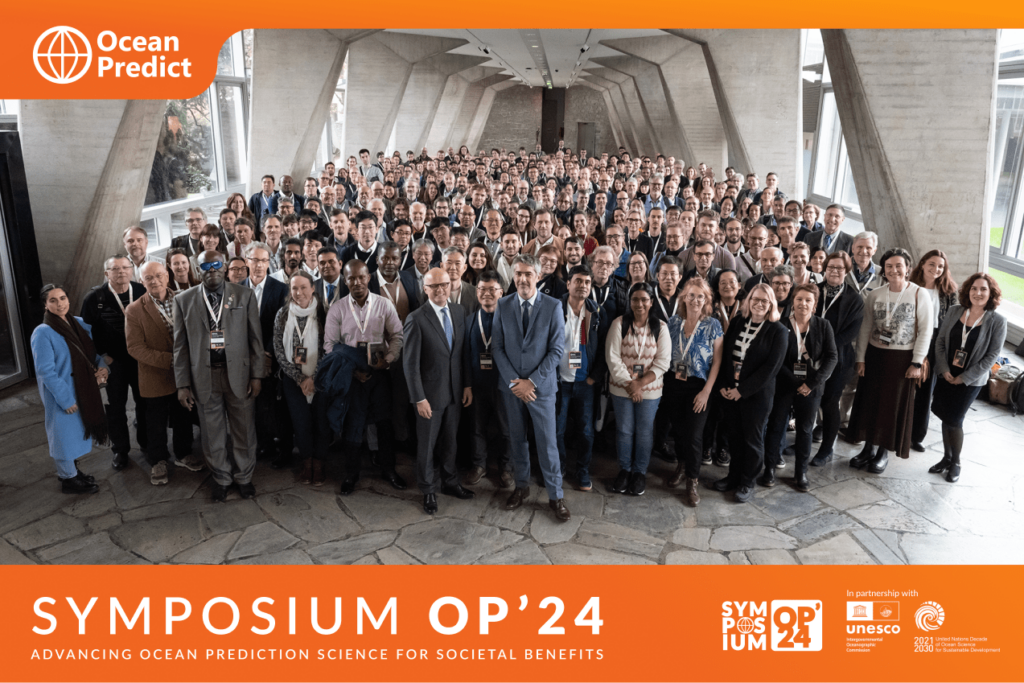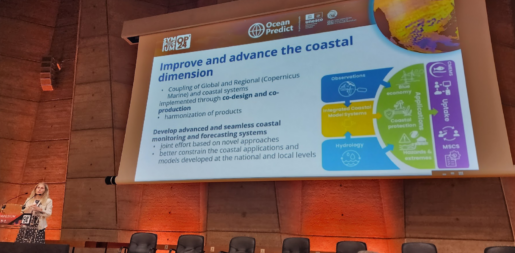OP’24 outcomes

The OceanPredict 2024 Symposium, organized by the OceanPredict/ForeSea programme in collaboration with UNESCO’s Intergovernmental Oceanographic Commission (UNESCO-IOC) was held from November 18-22 at UNESCO headquarters in Paris. The event marked a significant milestone in global ocean prediction science. It brought together 350 on-site participants and attracted 1,500 online registrations from around the world, highlighting its importance within the UN Decade of Ocean Science for Sustainable Development 2021-2030 (‘Ocean Decade’).
The Ocean Prediction community meets at UNESCO premises in Paris for the OP’24 symposium which was co-organised by OceanPredict/ForeSea and IOC
Over 300 contributions (orals and posters), fostered high-quality exchanges between leading ocean and atmospheric scientists, service providers, industry representatives, and users of Ocean data.
Experts focused on essential areas including coastal and regional ocean prediction, polar ocean and sea ice dynamics, and bridging global with regional scale predictions. Coastal regions face unique challenges due to complex interactions among currents, waves, and sediment transport. This complexity requires sustained observation networks and innovative approaches like multiscale modelling to improve accuracy.
Ensemble forecasting has become crucial for improving prediction accuracy and providing actionable uncertainty information. New satellite data, such as SWOT observations of ocean circulation and the increasing use of sea ice thickness measurements, are contributing to more precise forecasts. However, in situ observations remain fundamental to ocean prediction, with ongoing challenges in sustaining and expanding measurements to deeper ocean and biogeochemistry.

Joanna Staneva (HEREON) giving a keynote talk on coastal ocean prediction
Artificial Intelligence (AI) techniques are rapidly advancing ocean prediction capabilities across multiple domains. These innovations range from more accurate modelling with reduced computational costs to better estimates of previously unobserved ocean areas and parameters. Machine learning models are set to improve probabilistic forecasting capacities and enable fast, multi-resolution mapping of ocean conditions. Additionally, digital ocean twins are emerging as transformative technologies that promote collaboration and broaden access to ocean prediction tools.
The symposium highlighted the role of ocean prediction in informing policy decisions with actionable scientific insights that support sustainable management. For example, there is a pressing need for new standards in marine heatwaves forecasting and monitoring of their impacts on ocean ecosystems. Emerging initiatives on marine carbon dioxide removal also highlight the necessity for robust ocean monitoring systems to effectively confirm greenhouse gas emissions mitigation.
The event underscored the importance of structured international collaborations to align science, services, governance, and innovation. The Ocean Decade presents a unique opportunity to establish a framework that advances a sustainable global observing system for the blue, white and green ocean, while enhancing access to ocean prediction data.
Moving toward a future of open and accessible ocean information, it is vital to mobilize efforts across the entire ocean information value chain. The upcoming UN Ocean Conference (UNOC), in June 2025 in Nice, will serve as a platform to promote this call to action using the outcomes of the OP’24 symposium. Together, these collective efforts will help protect our oceans and support resilient coastal communities facing climate change, ultimately contributing to a sustainable future for all.
Please visit Symposium OP’24 website to explore all the content.
You can access the following resources:
- Recordings and oral presentations (“Oral records” section)
- OP’24 summary (OP’24 Summary)